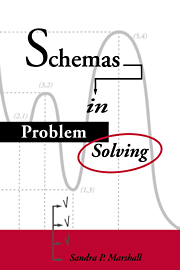
-
Select format
-
- Publisher:
- Cambridge University Press
- Publication date:
- 22 October 2009
- 30 June 1995
- ISBN:
- 9780511527890
- 9780521430722
- 9780521043694
- Dimensions:
- (228 x 152 mm)
- Weight & Pages:
- 0.759kg, 440 Pages
- Dimensions:
- (228 x 152 mm)
- Weight & Pages:
- 0.627kg, 440 Pages
- Subjects:
- Psychology, Cognition, Educational Psychology
You may already have access via personal or institutional login- Subjects:
- Psychology, Cognition, Educational Psychology
Book description
Schemas in Problem Solving explores a theory of schema development and studies the applicability of the theory as a unified basis for understanding learning, instruction and assessment. The theory's prescriptions for teaching are direct, and its application to assessment suggests new directions for tests. After examining the roots of the theory in earlier work by philosophers and psychologists, Marshall illustrates the main features of her theory with experimental evidence from students who are learning to recognize and solve arithmetic story problems. She describes individual performance with traditional empirical studies as well as computer simulation. The computer simulation reflects an approach in modelling cognition. Marshall's model links neural networks with symbolic systems to form a hybrid model that uses pattern matching of sets of features as well as logical step-by-step rules.
Reviews
"...a solid and interesting book..." Wayne D. Gray, Contemporary Psychology
"Cognitive scientists, philosophers, psychologists, and educators will find this book to be fascinating reading." Jenny A. Piazza, Teaching Children Mathematics
"...this book presents several methodological approaches which should prove invaluable to anyone attempting to apply variations on this schema theory to their domain." John Begoray, Journal of Educational thought
Contents
Metrics
Full text views
Full text views help Loading metrics...
Loading metrics...
* Views captured on Cambridge Core between #date#. This data will be updated every 24 hours.
Usage data cannot currently be displayed.
Accessibility standard: Unknown
Why this information is here
This section outlines the accessibility features of this content - including support for screen readers, full keyboard navigation and high-contrast display options. This may not be relevant for you.
Accessibility Information
Accessibility compliance for the PDF of this book is currently unknown and may be updated in the future.


